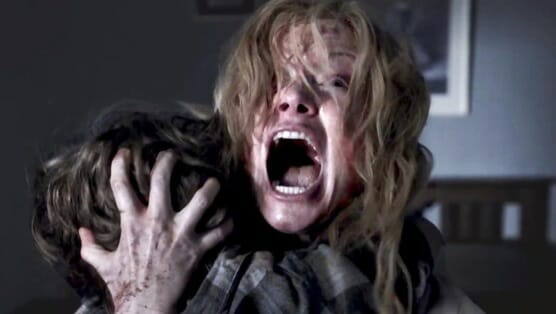The Babadook

Classifying Jennifer Kent’s feature debut, The Babadook, is tricky. Ostensibly this is a horror film—freaky stuff happens on an escalating scale, so qualifying Kent’s tale of a single mother’s fractious relationship with her young son with genre tags seems like a perfectly logical move. But The Babadook is so layered, so complex and just so goddamned dramatic that categorizing it outright feels reductive to the point of insult. There’s a grand divide between what Kent has done here and what most of us consider horror. You’ll spend your first week after the experience sleeping with the lights on. You will also come away enriched and provoked.
Australian actress-turned-filmmaker Kent has made a movie about childhood, about adulthood, and about the nagging fears that hound us from one period to the next. Given that The Babadook’s driving supernatural element derives from an innocuous-looking children’s book, it’s remarkably mature. Kent’s clean, controlled mise-en-scène oozes sophistication while belying the terrors bubbling beneath its surface. There’s a monster in the closet—and under the bed, and in the armoire, and in the basement—but the film’s human concerns are emotional in nature. They’re not aided by the ephemeral evil lurking in the dark places of its characters’ hearts, of course; going through personal trauma is enough of a chore when you’re not being stalked by the bogeyman.
But there’s a fundamental crack in the bond Amelia (Essie Davis) shares with her son Sam (Noah Wiseman), and it’s far more insidious than any ill-intentioned specter. The Babadook begins in a dream, where Amelia relives the evening she gave birth to Sam and lost her husband in a grisly car accident en route to the hospital. It’s a cruel twist of fate that has left her shell-shocked and struggling seven years on; she does the best she can to love her boy in the face of tragic circumstances, but Sam’s a handful and Amelia’s exhausted, so you might forgive her if she’s occasionally short on patience. We feel their loss, and the strain it puts on their relationship, immediately.
-

-

-

-

-

-

-

-

-

-

-

-

-

-

-

-

-

-

-

-

-

-

-

-

-

-

-

-

-

-

-

-

-

-

-

-

-

-

-

-








































